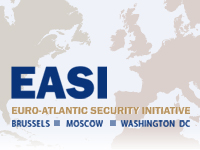Registration
You will receive an email confirming your registration.
The Euro-Atlantic Security Initiative (EASI) was launched in 2009 as a forum to work toward incorporating Russia, Europe, and the United States into a shared security community. The recent NATO summit and the upcoming Organization for Security and Co-operation in Europe (OSCE) summit provide important opportunities for the Initiative to engage with and influence the formation of policy that will define relations in the Euro-Atlantic sphere for years to come.
EASI co-chairs, Former Senator Sam Nunn of Georgia, Former German Deputy Foreign Minister and Ambassador Wolfgang Ischinger, and Former Russian Minister of Foreign Affairs Igor Ivanov, met via live video conference to discuss EASI’s agenda and vision for a Euro-Atlantic security community. Former Ambassador and Deputy Foreign Minister Oleksandr Chalyi of Ukraine and Carnegie’s Matthew Rojansky joined from Brussels. EASI’s Director, Professor Emeritus Robert Levgold of Columbia University, moderated the discussion from Washington, D.C.
New Definitions of Security
Nations still construct their military doctrines to guard against the relatively obsolete twentieth-century threat of invasion by a foreign state. Yet international understandings of security have shifted. The EASI co-chairs argued that paradigms for pursuing security ought to shift as well. They outlined some of the nebulous, unconventional threats that face the Euro-Atlantic region, including energy security, narcotics and human trafficking, infectious disease, organized crime, terrorism, bioterrorism, protection of critical infrastructure, and cybersecurity.
The co-chairs concluded that such threats are best combated collaboratively,. Threats stemming from weak and failing states – states that cannot protect their citizens or meaningfully secure their borders – have become the norm, and confronting them will require coordination and cooperation between the United States, Europe, and Russia.
What EASI Aims to Accomplish
As Nunn observed, “There can be no coherent effective global security strategy that does not take Russia into account.” EASI aims to generate a Euro-Atlantic security community that operates as a single entity. This will increase warning of potential threats for NATO and Russia, reduce the risk of accidental nuclear exchange, and provide a sturdy foundation of transparency and multilateral confidence. The militarized framework of NATO-Russia relations should give way to an “umbrella of mutual trust,” contended Nunn.
The co-chairs stressed that the NATO summit in Lisbon and the OSCE summit in Astana are important opportunities to build the trust necessary to establish a viable security framework. They also described some of the problems facing the creation of a real security community:
- NATO: NATO adopted a new Strategic Concept at the Lisbon Summit this month in which it reaffirms that NATO poses no threat to Russia. Ischinger emphasized that NATO must make progress on arms control and disarmament.
- OSCE: The OSCE will convene for the first time in eleven years this December. The summit will hopefully result in a “meaningful document” outlining an enhanced role for the OSCE, Ischinger said.
- Frozen Conflicts: Protracted conflicts, such as Nagorno-Karabakh, need to be addressed. There has been some positive momentum on this front, with Russian President Dmitri Medvedev making encouraging statements about his willingness to work with the EU and the United States in resolving frozen conflicts.
- Arms Control: Outdated agreements on conventional arms control need to be revised, Nunn commented. He argued that every country should feel secure about its borders and safe from the threat of surprise attacks, which will allow them to reduce weapons holdings. This is a key step toward enabling progress on NATO and Russia’s tactical nuclear postures. Nations must recognize that accidents and miscalculations are significantly more likely than intentional nuclear use. Ultimately, Nunn observed, nuclear weapons are more a danger than a source of protection for their possessors.
- New START: Signing the treaty provided an auspicious signal to EASI’s efforts towards a Euro-Atlantic security community. Given the recent U.S. midterm election, Russia is understandably concerned about ratification. Ivanov and Ischinger expressed hope that the new Congress will not undermine the U.S.-Russian ability to hold and conclude further negotiations on weapons reductions. A constructive relationship at the presidential level should advance relations, Ivanov added.
- WTO: Russian membership in the WTO would enable increased collaboration across a number of crucial fronts. Accession could occur as early as the beginning of next year. However, the co-chairs warned, the outstanding issue of Russian-Georgian tension, and in particular Georgia’s efforts to block Russian accession, will likely be difficult to resolve.
- Bilateral Progress: Nations involved in a Euro-Atlantic security community must confront the historical tensions that might inhibit trust, difficult as such a task may be. Russia and Poland have made significant advancements in this regard, commented Nunn. Yet challenges remain, most notably for improving relations between Georgia and Russia. Critically, Georgian separatist zones must be addressed and Georgia needs to feel assured of its territorial integrity and sovereignty. As EU Special Representative for Georgia Pierre Morel noted, the international community will be watching Astana and Lisbon for signals and statements on Russo-Georgian relations.
Forming an effective Euro-Atlantic partnership is a significant undertaking, the co-chairs concluded. By outlining and adhering to concrete steps, EASI is optimistic about its capacity to build a more cooperative and secure system.
